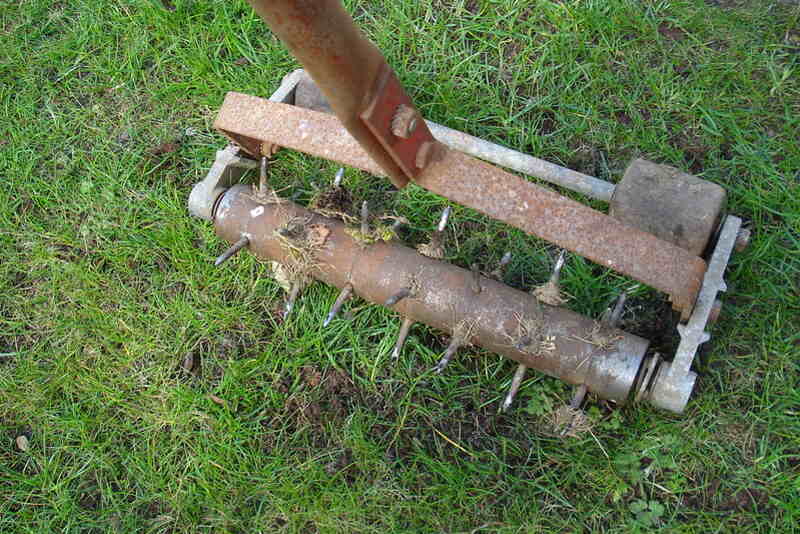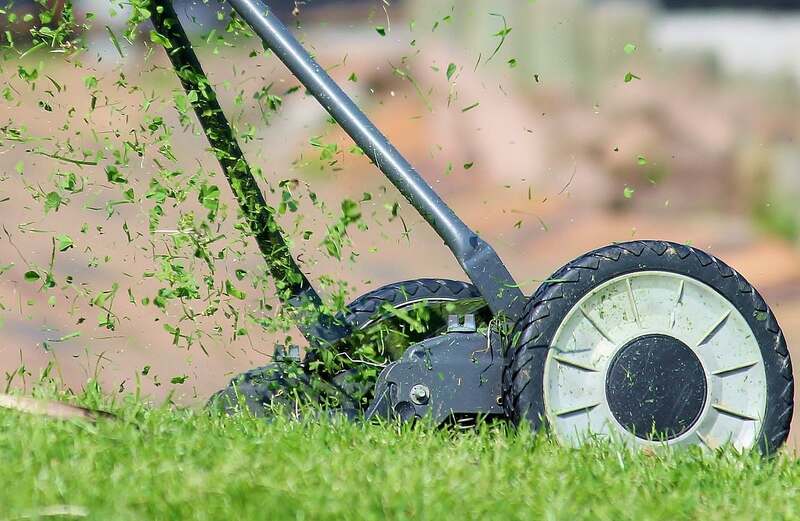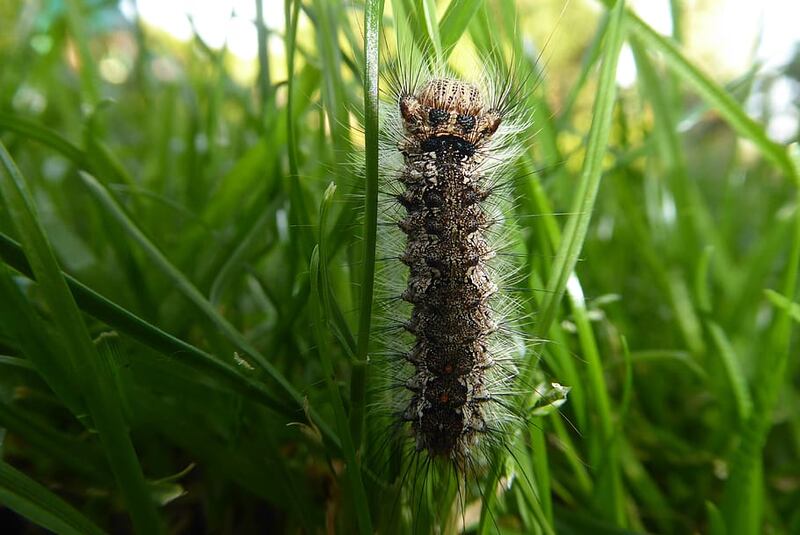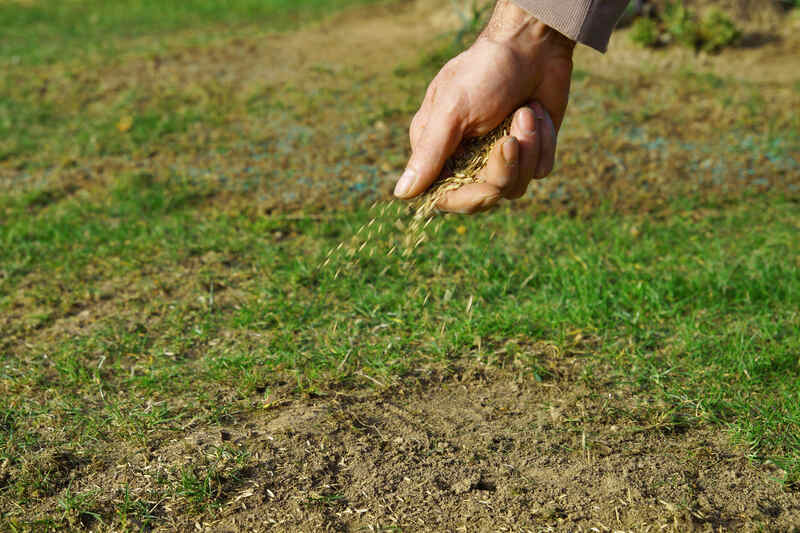
Fall is an important time for lawn care. Not only do you have to fix any issues caused by the summer heat, but you also have to winterize your lawn, preparing it for the coming cold months. What you do this fall will influence how well your lawn can handle the wintertime. Here are some fall lawn care tips for Jacksonville homeowners:
Aerate Your Lawn

After the heat of summer, your lawn’s soil may be dry and compacted. In these cases, it’s a good idea to aerate your lawn. During aeration, you poke small holes in your lawn’s soil, loosening up the compacted dirt. Without aeration, water, air, and nutrients may have a hard time getting to your turf’s root system.
Aeration is typically a part of spring lawn maintenance, but you can also aerate your lawn in the fall. Spring is just the best time to do it if you can only aerate your yard once a year.
Don’t Mow as Often

In fall, your lawn is winding down its growth in preparation for winter dormancy. So, you should start cutting back on how often you mow the lawn. When you do mow your grass, remember to mow it to the proper height to foster a strong root system. Strong roots make your turf more cold-tolerant and drought-resistant. Weak and stressed-out grass invites pests and lawn diseases in the winter.
The best lawn mowing height depends on what grass type you have. Here are the recommended mowing heights for the most common grass types in Jacksonville:
- St. Augustinegrass: 3 ½ to 4 inches
- Zoysiagrass: 1 to 2 inches
- Centipedegrass: 1 to 2 inches
- Bermudagrass: ½ to 1 ½ inches for hybrid cultivars, 1 ½ to 2 ½ for common Bermudagrass
- Bahiagrass: 3 to 4 inches
Make sure you’re not taking off more than ⅓ of your grass’s height at a time so it can recover.
Don’t Fertilize Too Late
Fertilization is an important part of maintaining a healthy lawn, but you shouldn’t fertilize your lawn too late. Any fertilizer applied to your lawn after it goes dormant will be wasted, as the fertilizer will just leach into the soil. If your grass does grow during this time, then it will attract pests.
September should be the last time you fertilize your lawn with nitrogen-based fertilizers before the year ends. Go with a slow-release fertilizer: Look for one with an equal or almost equal nitrogen-to-potassium ratio. It shouldn’t be more than 2% phosphorus, either. Aerate your lawn before fertilizing for the best results.
Avoid using weed and feed products, which are a combination of herbicide and fertilizer. The times for lawn fertilization and weed control are completely different in Jacksonville, so you won’t get the full benefit of either product if you use them in tandem.
Exterminate Pests

Many common Jacksonville pests are active during the fall, especially caterpillars like the fall armyworm and tropical sod webworm. Some other pests that can call your lawn home are white grubs, mole crickets, and chinch bugs. These pests can wreak havoc on your lawn, causing patches of discolored turf. If you’re not careful, your lawn might even get patches of dead grass.
There are a few ways to deal with these pests. You can contact a pest control company, apply pesticides yourself, or go the natural route with eco-friendly pest control products. You can also hand-pick the bigger pests.
Deal With Lawn Disease
Although there aren’t as many lawn diseases in the fall compared to the summer, there are still a few. Lawn diseases are often caused by overwatering and are made worse by stressed-out turf. If your lawn has patches or rings of yellowing, browning, or dead grass, or if your grass blades have spots on them, then you might be dealing with lawn disease. Here are some lawn diseases that can crop up in the fall:
- Large patch
- Take-all root rot
- Helminthosporium leaf spot
- Rust (more toward the end of fall and into winter)
Use Pre-Emergent Herbicides if Needed
Did you have trouble with lawn weeds in the winter last year? Early October is the time to apply preventative pre-emergent herbicides to prevent winter weeds from springing up in the coming season. If you see any weeds this fall, you should deal with them, too. Hand-picking is generally recommended if it’s only a few unwanted plants.
Overseed for Winter Color

Many homeowners want a green lawn all year round, but it’s not really possible during the winter. Or is it? While warm-season grasses start going brown and dormant when the temperatures get colder, there is a way to make sure your lawn looks green in the winter: overseeding.
Overseeding your Jacksonville lawn with cool-season grass – like ryegrass – gives you a temporary green lawn throughout the winter. The temporary turf dies in the spring when temperatures warm up.
The University of Florida Institute of Food and Agricultural Sciences (UF/IFAS) recommends overseeding your North Florida lawn in the fall. October to November is the sweet spot, as that’s when daytime temperatures start consistently hitting the low to mid-70 range.
Keep Your Yard Clean
Gold and red leaves often accompany the fall season. While these are beautiful sights to behold, you should clean up when your Jacksonville shade trees start dropping their leaves. Leaf removal is quite important, as leaves can block your turf from the sun and choke it out. Look out for other debris and clean them up as well.
FAQ
Yes! Getting your soil tested is a good way to know what nutrients your soil is lacking. You’ll also find out its pH level, which is useful to know, as plants typically only survive in soils with certain pH levels.
It depends, really. The UF/IFAS doesn’t recommend liming your lawn unless a soil test says you need it. Liming can be harmful to your lawn if it’s overdone; it can kill your grass! If you do need to lime your lawn, fall is a good time to do it. Always lime before fertilizing.
Generally, once or twice a week should be enough. However, you should always look at your lawn before letting your irrigation system run. Water your lawn only when you see these signs:
• Grass blades fold up
• Wilting
• Grass turns blue-gray
• Footprints don’t disappear after you walk on the grass
Hold off on watering your lawn if it just rained or if it’s predicted to rain soon. An underwatered lawn is better than an overwatered one, especially as you head into winter. You should also keep your irrigation schedule in mind; it depends on your street address. Read these watering tips for Jacksonville homeowners to find out more.
Don’t Fall Behind On Your Jacksonville Lawn Care
In the fall, your beautiful lawn is winding down on its growth. However, this doesn’t mean you should start relaxing with your lawn care. Fall is an important time for your lawn because you need to prepare it for the winter.
Do you think winterizing your lawn takes too much time? Why not hire a Jacksonville lawn care service to do the heavy lifting for you? LawnStarter can connect you with a local lawn care company with the click of a button. Contact a Jacksonville lawn care service today.
Main Image Credit: Ebyabe / Wikimedia Commons / CC BY-SA 3.0